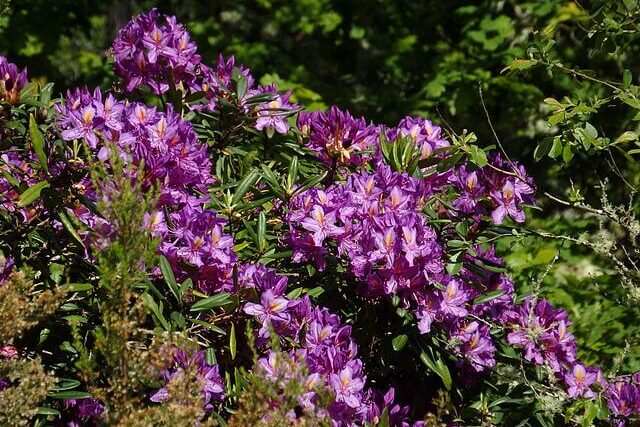
Rhododendron ponticum, an invasive species from the Mediterranean and Asia, covers at least 37,600 hectares (93,000 acres) of land in England, mostly in the west of the country. This invasive shrub is a major threat to England’s temperate rainforest and could take up to 250 years to eradicate at the current rate of removal, according to new figures.
The UK government pays landowners between £2,800 and £4,400 per hectare to remove rhododendron, and since 2015, the Environment Agency and Natural England have had the power to compel landowners to remove the plant. However, figures from Green MP Caroline Lucas show that between 2015 and 2022, only £3.39m was spent on rhododendron control in England, about £423,845 per year, suggesting that a maximum of 151 hectares of rhododendron were cleared annually.
The Lost Rainforests of Britain campaign warns that at this rate of clearance, rhododendron will not be eradicated for a quarter of a millennium, causing further damage to the remaining 18,870 hectares (46,628 acres) of English temperate rainforest. Guy Shrubsole, who leads the organisation, says the government must commission a rainforests strategy for England that addresses threats like invasive species and sets a goal of doubling the area of temperate rainforest within a generation.
Temperate rainforest once covered most of the west coasts of Britain and Ireland but today covers less than 1% of land, having been cleared over thousands of years. It is only found in isolated pockets, such as the waterfalls region in the Brecon Beacons and Ausewell Wood on Dartmoor. The campaign estimates that it could be restored across a fifth of the country.
Lucas says that temperate rainforests are a critical and undervalued part of the UK’s biodiversity, and invasive rhododendron poses a severe threat to their existence. She calls for greater funding and effort from the government to protect and restore these fragile ecosystems.
In Scotland, the government is clearing rhododendron as part of efforts to conserve native temperate rainforest. The country’s biodiversity minister, Lorna Slater, says the spread of rhododendron is a major threat to native woodlands, including Atlantic Rainforest.
A Defra spokesperson says the government is committed to ensuring that ancient trees and woodlands, including temperate rainforest, are adequately protected and suitably managed. The department also supports non-native invasive species Local Action Groups across England to improve biosecurity and reduce the risk from invasive non-native species, including rhododendron.
——————————————————————————
At Natural World Fund, we are passionate about stopping the decline in our wildlife.
The declines in our wildlife is shocking and frightening. Without much more support, many of the animals we know and love will continue in their declines towards extinction.
When you help to restore a patch of degraded land through rewilding to forests, meadows, or wetlands, you have a massive impact on the biodiversity at a local level. You give animals a home and food that they otherwise would not have had, and it has a positive snowball effect for the food chain.
We are convinced that this is much better for the UK than growing lots of fast-growing coniferous trees, solely to remove carbon, that don’t actually help our animals to thrive.
This is why we stand for restoring nature in the UK through responsible rewilding. For us, it is the right thing to do. Let’s do what’s right for nature!
Support our work today at https://naturalworldfund.com/ and join in the solution!

